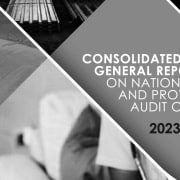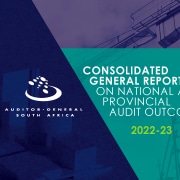|
Getting your Trinity Audio player ready...
|
Auditor-General Tsakani Maluleke appeared virtually before the parliamentary Standing Committee on the Auditor General on 9 February 2024, to brief members on progress regarding the material irregularities (MIs) it had identified during municipal audits.
Maluleke said that the presentation aimed to brief the committee on the impact that AGSA has been making in the implementation of its powers, especially in the local government sphere. During a previous appearance on 3 November last year she told the committee that AGSA had identified 268 material irregularities in the 2022/23 municipality audits under the Municipal Financial Management Act (MFMA) – 194 of these resulted in financial loss amounting to an estimated R5.19-billion.
Another 44 MIs were associated with substantial harm to public sector institutions (e.g. instances of repeated disclaimers and non-submission of financial statements), and a further 29 were associated with substantial harm to the general public (e.g. poor management of wastewater treatment plants, which led to pollution of water resources).
Most MIs related to procurement and payments, resource management, revenue management, and interest and penalties. The auditees had taken steps to recover R182.75-million and prevent R18.86-million worth of financial losses, and some were recovering R310.16-million, she said in November. This made a total of R511.76-million in financial losses prevented, already recovered, or in the process of being recovered.
Maluleke remarked at the time that issuing an MI notification to accounting officers often jolts them into action to address irregularities and transgressions that they should have dealt with previously. “In 86% of cases, nothing was being done to address the MIs we identified until we issued the notifications.”
The latest update revealed that as a result of the MI process several municipalities had improved in their efforts to submit financial statements, and there were improvements in municipalities that had previously had consecutive disclaimed opinions.
Improvement and action taken
The committee heard that most accounting officers were responsive to receiving an MI notice. In at least 57 instances (21%), the MI was resolved. In 95 instances (35%), appropriate action was taken to resolve the MI. In 31 instances (12%), AGSA did receive a response to its MI notification but was still in the process of assessing the appropriateness of the proposed action at the time when Maluleke tabled her latest report.
In 24 instances (9%), accounting officers had only recently been notified. The AGSA is awaiting a response on how the accounting officers intend to correct the MI.
However, in 61 instances (23%), no appropriate action was taken, which invoked AGSA’s powers. In these cases, Maluleke gave details of the specific municipalities and the type of action taken. These included recommendations in the relevant audit report (19), binding remedial action (25), issuing of notices of certificates of debt (2), referring to authorities for further investigation (12), and recommendations in the audit report with referral to public bodies (3).
In terms of municipal improvement, to date 46 municipalities improved their internal controls to prevent recurrence, said Maluleke, and 58 responsible officials were identified and underwent or are undergoing disciplinary processes.
There were 14 fraud/criminal investigations instituted, one supplier contract was stopped because money was being lost, and 19 outstanding financial statements were submitted.
An MI is resolved, said Maluleke, when an accounting officer takes all possible steps to recover financial losses or remove or address the harm caused, implement consequence management, prevent any further losses and harm, and through improved internal controls.
MIs cannot be ignored
An MI is any non-compliance with, or contravention of, legislation, fraud, theft, or a breach of a fiduciary duty identified during an audit performed under the Public Audit Act that resulted in or is likely to result in a material financial loss, the misuse or loss of a material public resource, or substantial harm to a public sector institution or the general public.
The AGSA started the process of implementing MIs four years ago after it received enhanced powers in the form of amendments to the Public Audit Amendment Act of 2018, which came into operation on 1 April 2019 and which are read with the Material Irregularity Regulations and Investigations and Special Audits Regulations, published on the same day.
Municipal accounting officers are legally obliged to take the necessary steps when notified of an MI and ensure that this gets resolved. These obligations are set out in the MFMA and its regulations.
In the 2018-19 cycle there were nine auditees and six MIs identified. In 2019-20 there were 57 auditees and 96 MIs, in 2020-21 there were 94 auditees and 185 MIs, and in 2021-2022 there were 170 auditees and 268 MIs.








